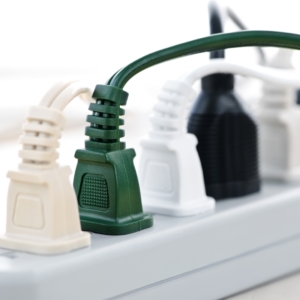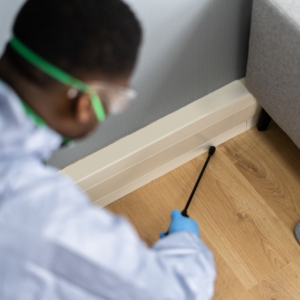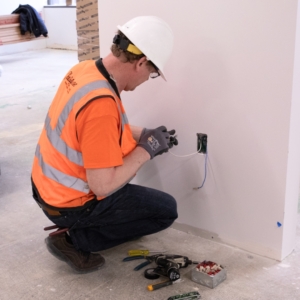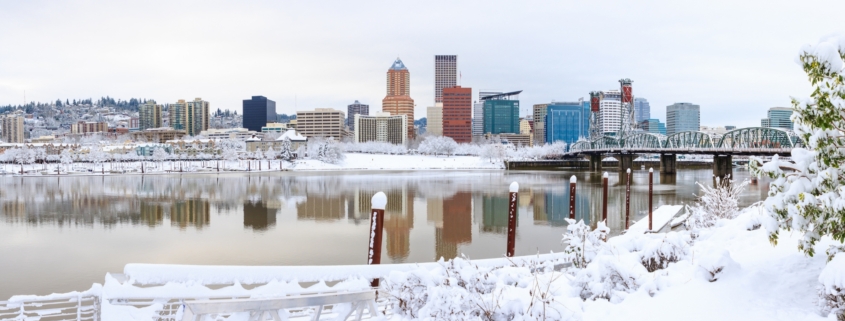6 Electrical Safety Tips for Pacific Northwest Winters
Winters in The Pacific Northwest can be unpredictable, and we might be in for an extra challenge this year. With a weak La Niña in the forecast, cooler, wetter conditions are expected. From heavy snowstorms to powerful wind gusts, residents across Oregon and Washington have already felt the impact of these unpredictable weather patterns in previous years, with many areas having faced statewide emergencies.
To help you stay ahead of the weather, we’ve rounded up six essential tips to help keep you safe, comfortable, and ready for whatever winter throws your way. Keep reading to make sure you’re truly winter-ready!

1) Use Power Strips, Surge Protectors & Extension Cords Wisely
Power strips and surge protectors may look similar but serve different purposes. A power strip simply adds more outlets, ideal for low-power devices like lamps and chargers. A surge protector shields sensitive electronics from power surges and voltage spikes. Surge protectors are essential for devices like computers, TVs, and game consoles.
Know the wattage rating of your power strips. This information can usually be found on the packaging or the power strip itself. Limit high-wattage electronics to avoid overheating, electrical failure, or fires. It’s recommended that only one high-wattage appliance be plugged into a power strip at a time. Even though there may be five or six outlets on the power strip that doesn’t mean you should use all of them at once.
Now, what about extension cords? They make it easier to plug in electronic devices a good distance from a wall outlet. However, they can overheat and become dangerous when used for long periods of time. They are designed for temporary situations and are not meant to be used as permanent power sources. Also, keep power strips and extension cords inside unless specifically designed for outdoor use.
Never cover extension cords, power strips, or surge protectors. Although hiding them under a rug or couch may be tempting, doing so increases the chance of an electrical fire. Daisy-chaining, or connecting multiple extension cords or power strips, is a recipe for disaster. When the number of outlets increases, circuits can easily become overloaded.
Think you might need more outlets or are worried about your home’s power usage? If you’re concerned about capacity, it’s always a good idea to consult an electrician to assess your electrical system and ensure it meets your needs safely.
2) Avoid Water When Putting Out Electrical Fires
What happens if an electrical fire breaks out in your home? Your first thought may be to put it out with water. However, using water to put out electrical fires is extremely dangerous. Water naturally conducts electricity and can cause electrocution, shock, or fire to spread.
If an electrical fire occurs, turn off the power and use a Class C fire extinguisher specifically designed for electrical fires. Call the fire department to ensure the fire doesn’t spread to other home areas. Always call in reinforcements for electrical fires to protect yourself and your family.
3) Be Aware of the Signs of Electrical Issues
Homeowners should be aware of five key signs of electrical issues: flickering lights, hot outlets, frequent circuit breaker trips, burning smells, and sparking or smoking outlets. These are warning signs that should never be ignored, as they may indicate serious safety hazards. In the winter months, you should pay extra attention to outlets, cords, and appliances to catch potential problems before they escalate. If you notice any of these signs, it’s important to contact a licensed electrician to assess the issue and recommend the best solution.
4) Keep an Eye Out for Pests & Get a Pest Inspection
As temperatures drop, mice and rats often seek warmth indoors, and your home’s electrical system can be a tempting refuge. Rodents are known to chew on wires, which can cause significant damage to your electrical system and lead to dangerous situations, such as electrical shorts, fires, or even power outages. If you spot signs of rodent activity—like droppings, gnaw marks, or unusual smells—contact a pest control expert.
Additionally, consider an annual pest inspection. Having a professional check for hidden damage to wiring inside walls will ensure that your home remains safe, especially during the high-risk winter months when you use more electrical devices for heating and lighting. By addressing the issue early, you can prevent costly repairs and reduce the risk of electrical hazards in your home.
5) Test Ground Fault Circuit Interrupters (GFCIs)
Ground fault circuit interrupters (GFCIs) are safety devices installed in areas like bathrooms and kitchens where outlets may be exposed to water. They protect you by shutting off power if they detect a ground fault—when electricity travels through an unintended path, like a person’s body. GFCIs can stop electrical flow in less than a second, preventing shocks and electrocution. If your GFCI isn’t working, or if you have concerns, connect with a qualified electrical professional.
6) Check for Exposed Wires & Loose Connections
Checking for exposed wires and loose connections is crucial for the safety and functionality of your home’s electrical system, especially after a winter storm. Strong winds can cause damage that’s difficult to spot, but faulty wiring can lead to serious risks like electrical shorts, fires, or even electrocution. Exposed or damaged wires may also allow corrosion to build up, which can worsen the issue over time.
Because working with electricity can be dangerous, it’s essential to leave any inspections or repairs to a professional. If you notice any signs of damage—such as frayed wires, discoloration, or unusual buzzing sounds—contact a licensed electrician to address the issue safely and effectively.
Connect With Trusted Electrical Professionals
Always work with electrical professionals to assess the safety and effectiveness of your home’s electrical system. At Powering Pacific Northwest (PPNW), we understand the importance of finding the right partner for your electrical needs.
PPNW members are committed to delivering top-quality service to homeowners across Oregon and Washington. Fully licensed and bonded, they stay up-to-date with the latest technologies and safety standards to ensure your home is in good hands.
Find a contractor today to prepare for a safe and happy winter season.



